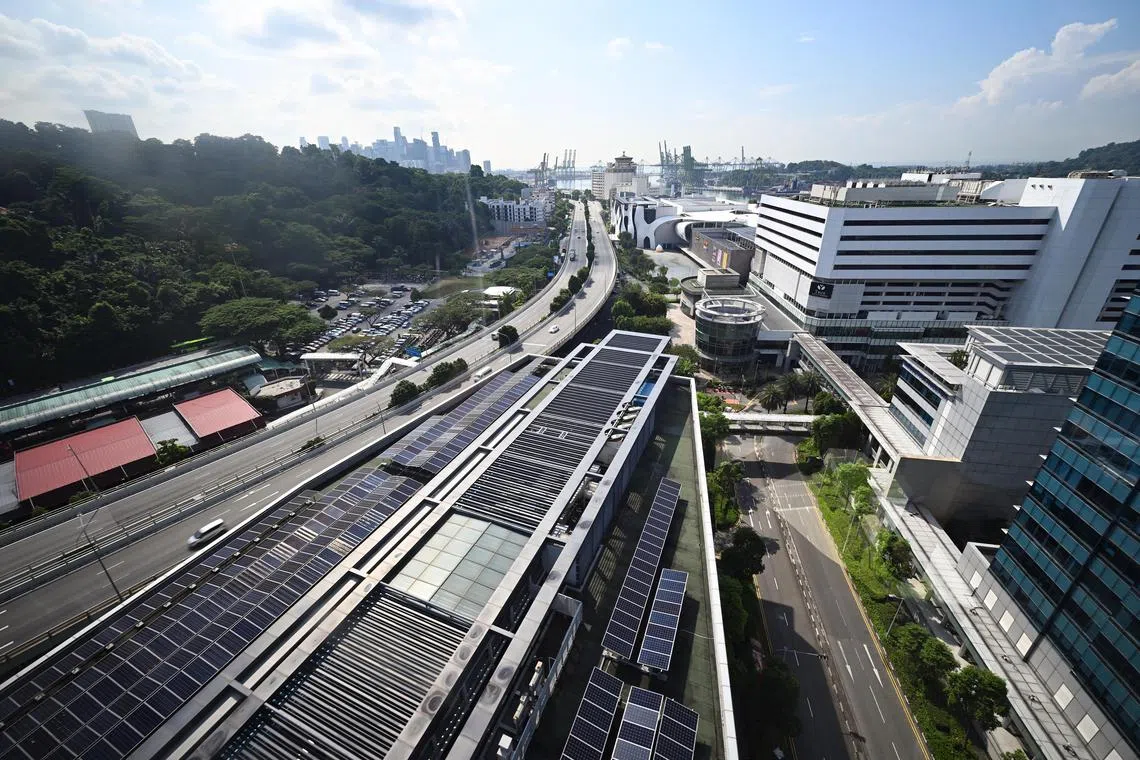Fewer than 4 in 10 Singapore companies face ‘minimal impact’ from carbon tax hike: Report
Sign up now: Get ST's newsletters delivered to your inbox

Solar panels seen on a building. Just 24.5 per cent of companies said in a survey a carbon tax rise led them to reconsider long-term sustainability strategies.
PHOTO: ST FILE
Follow topic:
SINGAPORE – Close to 40 per cent (37 per cent) of companies in Singapore experienced “minimal impact” from the hike in carbon tax, according to a survey conducted by the Sustainable Energy Association of Singapore (Seas).
A smaller proportion (24.5 per cent) of companies said the increase in carbon tax, which was implemented in January 2024, had led them to reconsider their long-term sustainability strategies, with close to 20 per cent indicating that they have stepped up efforts to reduce emissions and invest in energy-efficient technologies.
However, the survey, which polled 250 industry professionals, mostly in South-east Asia’s energy sector, also found that only a very small percentage (3.8 per cent) bought carbon credits, suggesting that the tax hike alone may not be enough to drive demand for companies to purchase carbon credits.
Singapore’s carbon tax rate increased from $5 per tonne of carbon dioxide equivalent to $25 per tonne from Jan 1, 2024.
Former managing director of the Monetary Authority of Singapore Ravi Menon had previously said that the carbon tax needs to go even higher to accelerate climate action to address global warming.
Overall, only 24.5 per cent of respondents felt that the carbon tax regime in Singapore was effective, though a significant proportion (41.9 per cent) found it to be moderately effective.
A very small percentage (6 per cent) viewed the carbon tax to be very effective. This suggested that while the mechanism is working, there is a need for further refinement and impact assessment to enhance its effectiveness, according to Seas.
In addition to the carbon tax, respondents were also surveyed on the pace of energy transition in Singapore and the wider Asean region.
While quite a large proportion (45.9 per cent) of respondents felt that Singapore’s progress was satisfactory, about 32.5 per cent said that more improvements are needed.
Only 17 per cent said that Singapore made “very satisfactory” progress, which indicates that while progress is recognised, there is still substantial room for improvement to meet Singapore’s target of net zero by 2050.
Respondents believed that the key drivers for decarbonisation were government policies (89.2 per cent) and economic incentives (59.8 per cent).
Over 58 per cent also thought that corporate sustainability initiatives are important. However, they are seen as secondary in terms of the influence and outcomes that government-led initiatives could yield.
The survey is also seeing growing demand for clean energy from large tech corporations, possibly due to the increased focus on artificial intelligence and data centre investments.
Dependence on natural gas (68 per cent), barriers in cross-border interconnection agreements (57.2 per cent), as well as regulatory uncertainties in tightened energy markets (40.2 per cent) were cited as the biggest regulatory hurdles for Singapore. This highlighted the challenge of coordination in balancing energy security with decarbonisation.
The main challenges Singapore faces in its decarbonisation journey, the survey results indicated, are limited space for renewable energy infrastructure (85.6 per cent), high costs and investment required (63 per cent), and limited avenues to offset carbon emissions (40.7 per cent).
A majority (67.9 per cent) believed that a carbon trading system would be effective in speeding up the pace of decarbonisation. About 32 per cent were sceptical, indicating that there are also concerns or doubts that need to be addressed to ensure widespread acceptance and success of a carbon trading system.
The carbon trading industry has been hit by scandals over the integrity of credits in the last two years, which led to a decline in prices and trading volumes.
Establishing comprehensive and reliable carbon accounting systems (69 per cent) and transparent regulatory frameworks (67.9 per cent), as well as having a competitive and attractive carbon pricing mechanism (63 per cent) are seen as critical for Singapore to be a key carbon trading hub.
Having a robust infrastructure for carbon trading transactions (58.7 per cent), and enhancing market liquidity and accessibility in the carbon markets (54.9 per cent) would increase participation. THE BUSINESS TIMES

